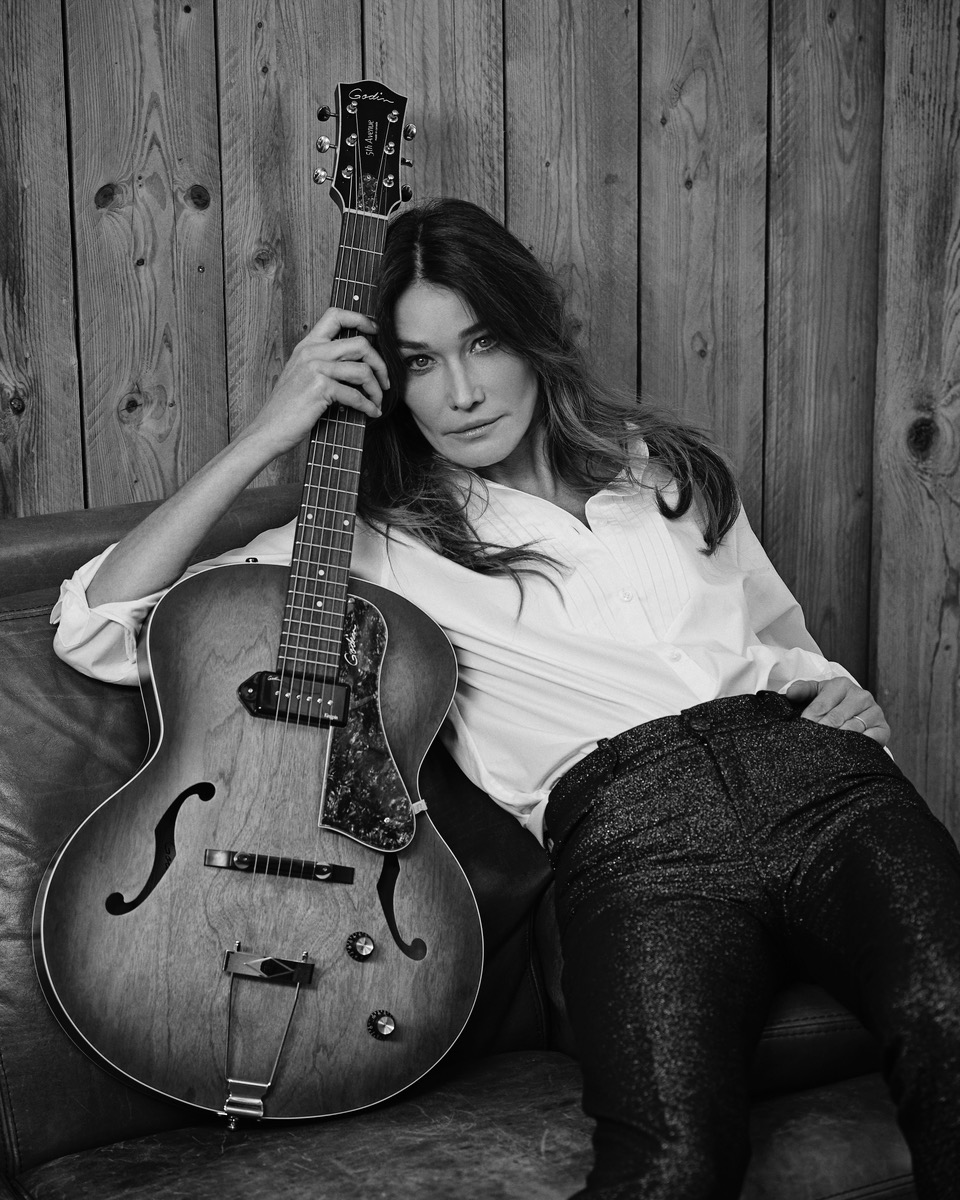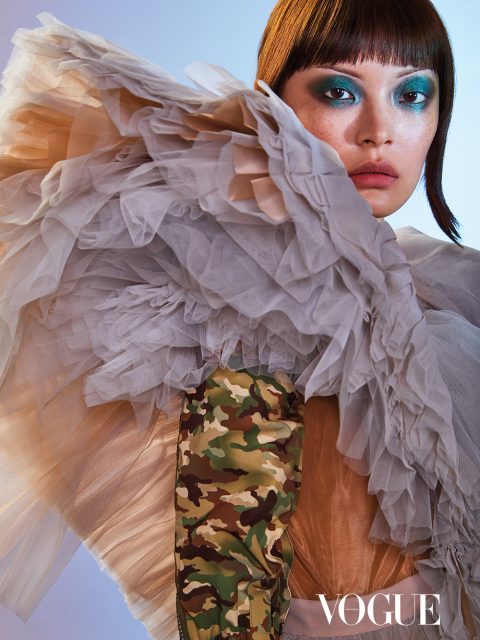The first thing that stood out to me was the inclusion of not purely French songs, but also exactly one song each in English, Italian and Spanish. I understand you wrote almost all of the songs yourself. When you were writing these songs, were they all in French originally? What was the reason behind having three of these songs in their respective languages?
There’s two songs which I wrote in Italian and English respectively, Voglio l’amore and Your Lady – they were actually directly written in their own languages from the beginning and never in French. Although I really like to write my songs in French, I do love to try other languages not just as a songwriter but also as a singer. That’s why I also chose Porque Te Vas, a Spanish song.
How did your experience working with Albin de la Simone compare to working with David Foster in French Touch? Are there any fun moments to share from the recording process?
Working with Albin and David were both very good times for me as a singer and also as a person because they are both very kind people even though they are really different. Being in the studio and recording music usually is a very fun moment in itself, so there are so many fun moments between musicians and the sound engineers. Life in the studio is like a very nice outside-of-reality bubble, I would say. It’s like a bubble.
What was main inspiration behind this album? Was there a general feeling or lesson that you were trying to convey? Is there a theme (or themes) or story linking all the songs together, and why did you choose Quelque chose as the lead single? Aside from this song, which songs in the album feel the most personal and close to your heart and why?
The main inspiration behind this album was love, desire, freedom and dreams, because the songs I write are also from dreams and are not always based in reality. All the songs in the album are very personal to me actually. It’s hard to choose a song that is the most personal because most of them are coming directly from my heart.
My personal favourites are Les séparés and Your Lady. I am very curious to hear about the process behind writing these two songs. Les séparés in particular has a very nostalgic and bittersweet feeling. What are these songs about respectively? What made you write them?
I’m glad you like Les séparés and Your Lady. They have a common point – they both are songs about impossible love and about being apart. So, Les séparés is a larger matter and it’s not only talking about couples or lovers, but also talks about being separate from each other – from family and friends, and maybe it also talks about being separate by death, you know. Your Lady is the classic song for impossible love and lost love somehow and I love to write about lost love because it’s very inspiring. I’m glad you like these songs.
In your songs, you make love out to be this beautiful but fragile and graceful thing. Love is all about the timing of one’s life, self-awareness, mutual growth, perseverance and perhaps little bit of luck. Has your view of love changed over time (from when you were younger – you have previously mentioned the idea of polyamory and not committing to one relationship)? How does it compare with the classic, romantic French ideal of love? What advice do you have for young women nowadays from your personal journey?
My view of love didn’t really change over time. Being 52 years old now, I feel the same about love. But what changed really, in my mind, is the importance I give to love, because when I was younger, love was very important of course, but I had other interests. I thought there were other things than love. I know now that there are not so many other things than love. Basically, love in the centre of life for every human being. And I’m not only talking about the classic type of love, but every type of love – you can love your friends, you can love your dog, you can love your parents, you can love your neighbour, you can love your garden – just being in a loving mood is good, I guess it’s good for you. I would advice a young woman today to leave a big room for love open, and also to believe in love, because life is better that way.
To me and many others I’m sure, you are a true embodiment of the modern-day Renaissance woman. It’s not easy to do what you have done, moving through multiple careers with dignity and always finding a new way to reinvent yourself and push yourself further while at the same time supporting your man through all the ups and downs of his career and educating your children, keeping them grounded no matter what happens. This requires a great deal of mental strength. How do you manage to stay level-headed through the good and bad? How do you keep your mental health in check and stay positive?
Thank you so much for your words! Well, I don’t know how I managed to stay level-headed through the good and the bad, but I always felt like a very lucky person, so I don’t feel that my life has been such a struggle, and adapting myself to situations and to different positions always felt more like an adventure than something difficult. And we all have to go through good and bad, you know, no one can escape the bad. ‘Bad’ is losing people, losing health…but there’s also good, so that’s how I keep my stability and my inner balance, just thinking how lucky my life is and how lucky I actually am.
You have played a much admired role as first lady. How did you adapt to the change of role from famous musician and star to a supportive role? Now that you are resuming a performance career, do you find another reversal of role between you and your husband? How has he been supportive to you in your music career?
When I met my husband, actually, I naturally became supportive of him, not only because he was the president of France and he was in such a special and incredibly particular position, but also because he was my husband and that’s what you do as a couple, you’re supportive of each other. So, to answer your question, he was always so, so supportive of me. And yes there was another reversal of roles between me and him, but it’s a constant reversal of roles. When he needs my support I’m here and vice versa. He has been very supportive of my career and is always very encouraging. He has been helping, he’s been listening to my songs over and over again when I begin to write my songs and he’s my first audience so he’s been extremely supportive, and he’s also been inspiring – I wrote a lot of songs about our love.
There are many definitions of success. What would success mean to you? What has your biggest personal milestone been so far?
There are many definitions of success indeed. To most people, success is when you happen to touch someone’s heart with something you do – some creation or some work or some speech or some movement – when something you do can touch a large amount of people, that’s what usually is called success. So it can be commercial or poetic and a very large amount of people can be touched by something even if it’s not commercial. Something that is for free, for instance, can be very successful. But my personal success would be against myself… it would be when I make myself, when I force myself to do something that I don’t want to do, and that I don’t like to do, and then I feel really satisfied. Sort of self-esteem success, you know like stopping smoking or exercising that gives a sort of, um, I wouldn’t call it success, but yes it’s a kind of success…with yourself.
How do you feel that this generation, Gen Z, is different from yours? How are your children different from you? What do you love about them in terms of ideals and values?
I believe every generation is different, and I believe the new generation is very different from ours. I think they’re sort of better. They’re more informed, they’re more aware and they’re more alarmed than we were. They’re more serious than we were. We didn’t feel so responsible of the world – they do. And I like their activism. I like their values. I believe they’re going to try to change the world – I don’t know if they’re going to achieve that, but you know, time is on their side.
What are three things that you are obsessed with lately?
Well, I’m obsessed with Palo Santo wood. It’s made of little sticks, you make them burn and they just make some incredible smoke that has a most lovely perfume. So I’ve been writing this whole album with these Palo Santo sticks burning. It’s a very special kind of wood, and it has a very slow way of burning and it gives a very nice atmosphere (I’m lighting one up while I’m talking to you). I’m also obsessed with a song that is called Wild Is The Wind. It’s a song from Nina Simone and I just love it. It’s a desperate love song. It’s not new. There’s also a David Bowie version but right now I’m completely obsessed with the Nina Simone version. If you have time, listen to it – it’s just so beautiful and so perfect. Third thing I’m obsessed with is my new guitar. I bought it very recently with my guitar player Tao, and it’s a beautiful little one from Canada. And here it is while I’m talking to you – it’s in my hands!
Photographer: Eric Guillemain
Talent: Carla Bruni
Stylist : Johanna Fath
Hair: Marion Anee
Make Up: Maria Alleaume
Production : 2b management
Editor
Olivia DawnCredit
Lead image: Eric Guillemain



